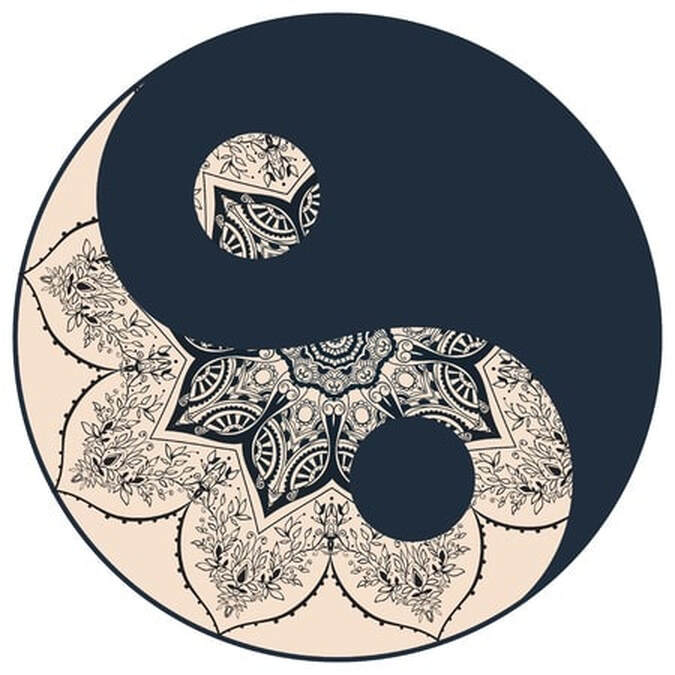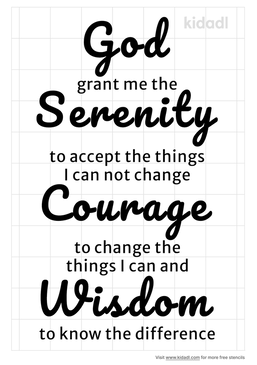 Image of a Yin and Yang symbol Image of a Yin and Yang symbol Consider that you may have it backwards: solutions don't make you feel better; solutions come once you've made yourself feel better. If you're a match to the problem, here's what it looks like: You're walking around feeling what it makes you feel—frustrated, scared, sad. You talk about what's happening as a problem to be solved (or as hard or impossible to solve), as urgent, as being terrible (or infuriating, or hopelessly unfair, or whatever the emotive flavor du jour). You think about it a lot (as a problem). You worry, strategize, agonize, obsess. This keeps you in the problem. If you're a match to the solution, you trust there's already a solution on the way—called in the moment you observed or named the problem. You know it's already okay and will resolve—all will come clear without your needing to know how right now. You're able to let go of the parts you can't control. You're watching for where you can step in gracefully; you're open to inspiration, which you can grasp and respond to quickly (catch the wave) because you're not weighed down with worry or even hopelessness. In short, you can hold the thing with curiosity and expectation, trusting that this problem is ultimately no problem, and simply move toward or open to the solutions as you see each next step or possibility. This brings in solutions. How do you get out of hard emotions that perpetuate the problem—or keep you as a match to the problem? The short version is, Quit putting a story to the feelings, and just be with the feelings. Or, since the story will assert itself, notice what you're saying to yourself or others about it, and quit saying it. Of course, you'll have thoughts. Thoughts happen. The trick is not to get involved with them. I have a client currently going through a break-up and she worked beautifully on simply witnessing thoughts moving through. They're so typical, those break-up thoughts, aren't they? I'm not lovable, No one will ever love me, There's something wrong with me, I'm no good at relationships. Later, in session, she and I were able to question and deconstruct those thoughts. On her own, she just put them aside and took care of her emotions. She let herself feel and cry without telling herself lies (or without focusing on and running with any lies that temporarily whispered to her). Think of writing thoughts down as a great and crazy-simple tool for getting them put down and put away without your losing track of what they can reveal. (Ah, a break-up still shows me what's left of my illusion of unworthiness.) If you want to look at them later and pull them apart, call them for the lies they hold, or see what else is true besides what you were believing at your worst, do that. A how-to note: Try making lists of short, simple sentences, one thought per line, instead of journaling—which can have the same negative effect as telling it all to a friend. You expand the problem and all the feelings around it as you tell detail after detail, and embroider without even noticing, and throw in a bunch of interpretations as if they were facts. (She undid everything I'd worked on since the project began. They threw me under the bus.) Focus on soothing what feels bad—not understanding it, fixing it, or making it go away; not coming up with solutions so you can feel better. Consider that you may have it backwards: solutions don't make you feel better; solutions come once you've made yourself feel better. Thus, simply being with the feelings kindly becomes your first priority, and you can feel good (not irresponsible) about not thinking it through. Look away from the story, and make it your one and only job to soothe the feelings. Be your own mama to your own inner sick kid, and do anything to make things feel better. (If you're male, ungendered, gender-fluid—whatever—still be your own mama.) Maybe it won't look like reading aloud, bringing juice popsicles, making soup, stroking a forehead, or singing songs (though it could). It might initially look like simply witnessing the pain, allowing it, dropping into it, giving it breath (the only balm you can apply from within). If you don't have my book, Scooch!, you can get it from Amazon as a real book or an e-book (you can also peek in and read a bunch with Look Inside feature). Chapter 3 walks you through separating out minding the pain body and tending the mind. Chapter 5, “Good Tears versus Bad Tears,” describes how to release emotion without getting sucked into story. Quit figuring out the solution. Get out of ploblem solving. When effort and striving characterize a search for solutions, you're still a match to the problem. Instead, scooch toward trust that you're fine and the solutions will come. Then you're in what Abraham-Hicks calls a space of allowing, and solutions can come in (more) effortlessly, perhaps in unexpected ways. A how-to note: Speaking of Abraham, you can use their tactic (and easy-to-remember two-word admonition) GO GENERAL. Pan out and away from the details you've got under the microscope, and tell yourself general things you can believe: I don't have to figure this out right now. I've been in worse places and it worked out. I can think of one person right now who's had a similar experience and got through it. They may be able to provide support and resources. I'm doing fine. I can think of three things I've done right recently in this realm and whatever I've done wrong is probably fixable and certainly forgivable. Keep talking for as long as you need to to reset your mind toward the general, believable, and kind without needing to work out any particular kinks in the tubing. By the way, I'm not categorically against problem-solving. Brainstorming and pushing around puzzle pieces have their place. Do them after the soothing, when you're in a space of allowing. How fine and well (relaxed, trusting, joyful, present) can you be before the solutions come in? Being a match to the solution does much more than bring in solutions. It allows you to be fine before solutions come: you're already okay; you don't need solutions to make you okay. It creates the openings for solutions to come. It allows you to see when radical solutions are needed or, conversely, when there's actually nothing to do whatsoever. It also releases you from urgency and the illusions around timing and time that we human beings so easily fall prey to. The basic concept in this writing comes from Abraham-Hicks, and their language goes like this: “Be a vibrational match for the solution, not the problem.” I know that as soon as the word vibration gets in somewhere, it can sound airy-fairy. That's why I saved it for last. And have you read up to this point? This is so solid. If you're not sure it'll work, I invite you to experiment with it (and make it a grand experiment—what have you got to lose, except a furrowed brow and tense muscles?). For myself, once I got past the languaging, I found that Abraham's teachings often come to me in an instant on a deep level, and then I tease them out to understand the application through various means: things they say and things I experiment with on my own and the seemingly magical ways, right when I'm working with a particular idea, that my clients seem to have stuff come up that obviously asks for just that concept. Now that this is part of my conceptual tool kit, I notice that people can have a releasing ah-ha when I simply point out that they're being a vibrational match for the problem. So hey, what problem are you a vibrational match for right now? Wanna be a match for the solution? Love & blessings, Jaya
0 Comments
Scroll down to #6 if sleep is your greatest challenge. 1. Your little life still matters. In the midst of all this big political stuff, and in the face of evidence that certain peoples are suffering or will suffer more because of the current powers that be, still, believe that your little life still matters. Of course you don't want to go all insular right now and forget about the good of all concerned. But some people stop tending their lives altogether at times like this! Others get sloppy in the tending, let go of countless kind details, forget to infuse their home and work space and inner world with love—and that omission won't support the good that can be directed outward. Still others let go of what really matters to them, treating the passions that activate their life force like frivolous (rather than life-sustaining and soul-supporting) matters. Hey, there were bad things happening before, and you were still willing to polish your boots and give time to buzzy creative endeavors that make you lose time! Until you die, whatever ebbs and flows around you, tend your beautiful life. 2. Speaking of death, use the current state of affairs as the current support to face and get okay with your own mortality. The Buddhists (this just made me laugh as it reminded me of how Trump says "the gays") (the Buddhists love me)—they suggest that we keep our death in view every day. This does a number of things, like keep us real about impermanence, our own included, and promote presence: I'm still alive today, so how can I love (or at least tune in to) every minute of it? When people express their greatest fears about the current regime, it's clear that these get pretty extreme: they go all the way to total annihilation of the human race and perhaps the earth. So (I know this is radical) what if you got okay with life on earth as impermanent—the human experiment and the earth experiment as time-limited from the start? Let's say somebody's going to be here when that grand ending occurs. What if it's you? What if you were willing to be in those numbers? What if death is so okay in the grand scheme of things that even the deaths of hordes of people at once can ultimately be okay in the eternal scheme of things? I hope you're not reading in anything I'm not saying. I'm not justifying genocide here. I'm not proposing you shouldn't care about the Earth or life on this planet. My intention is to help you let go of having to ward off death either for yourself or, ultimately, the whole human race or the planet, so you can get on with the business of living. In fact, you can live boldly and beautifully, truly voting for what you want with all that you think and speak and choose and do. If horrible things aren't what you vote for, then don't think and talk about them, picture them, rehearse them, discuss them, carry them around in your twisted gut or raw chest, and fall asleep envisioning them! Let go of what you can't control, get okay with your death (yeah, why not, every day) and go about the business of living an inspired life. 3. Please, don't use a president you disapprove of (or fear) as an excuse to revert back to old habits that you know are self-destructive, or go back to the ex you know isn't the right match, or hang out with friends who bring you down, or make any number of wacky, self-sabotaging choices as if personal insanity were a reasonable response to the unreasonable (and perhaps insane) in politics. No no no no no. At the risk of repeating myself, keep living like it matters (and sure, dance like no one's watching, while you're at it). Are you having one more glass of wine than usual? Try one less, and maybe one more bubble bath. 4. Use this time to keep learning more deeply and consistently that you can (and are better off when you do) focus on where you actually have agency. Take responsibility for your life, your state, what you cultivate internally that you then put out to others, and what you do for the greater good in smaller or larger arenas, from your household to the world. I know I sometimes harp on Byron Katie's three kinds of business (quit yawning) and I did include a whole chapter about them in my book (chapter 7, Getting Out of Overwhelm)—but that's because it's seriously liberating (no, seriously, LIBERATING) to get very clear about where you do and don't have agency and to put your energies where you do and only where you do. Aaaaaaaaall your efforts aimed at what you can't control (including worrying, agonizing, talking about how we're all screwed, etc) can only exhaust and overwhelm you, and will not likely lead you to right action or a good life. They won't set you up to offer your best support to those in need, either. There's a reason the famous Serenity Prayer is all about locating what you have the power to change and letting go of what you do not. 5. Use this political climate to keep learning more deeply and consistently that you get to control your own focus and your own state. A president you don't like doesn't have the power to keep you from joy, clarity, kindness, alignment, or anything else—unless you turn that power over to him (I use the gender-specific him here for obvious current reasons). If you consume a steady diet of bad news; if you join in or eavesdrop upon spoken or written conversations centered around fear and focused on what we're against; if you fail to draw internal mental boundaries that can keep out what isn't here when it's not here—then you yourself (not the current politicians in charge) are responsible for your misery and eventual ineffectiveness in supporting, promoting, creating the climate you want. (The Focus Wheel from Abraham-Hicks is my favorite tool for choosing and redirecting my focus.) 6. Use this time to keep learning more deeply and consistently that you get to control your own sleep. (In the beginning of healing ruptured sleep, this means surrendering to lying awake and using that time well, for deep rest and lying-awake meditation, so that in not grasping at elusive sleep, you can gently call it back.) There's no use lying awake nights because you don't like what's going on. It's so much kinder to get rest. Again, don't give a political regime you disapprove of the power to keep you from your well-being. Here's a link to audio and written sleep resources I've put together for anyone troubled by sleeplessness for any reason. Love & blessings, Jaya |
Categories
All
|


 RSS Feed
RSS Feed